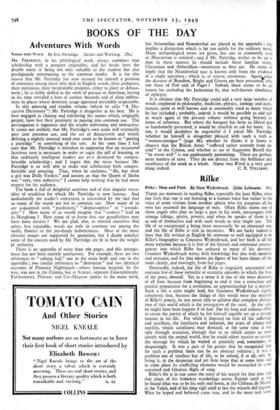BOOKS OF THE DAY
Adventures With Words
Name into Word. By Eric Partridge, (Seeker and Warburg. 25s.) Mn. PARTRIDGE, in his philological work, always combines true scholarship with a pungent originality, and his books have the double merit of being not only valuable to the student but also prodigiously entertaining to the common reader. It is for this reason that Mr. Partridge has now secured for himself a position of eminence among those who deal in English words, their pedigrees, their mutations, their incalculable progress, either to glory or debase- ment; he is richly skilled in the work of pursuit or detection, having in his time revealed a host of curious bastards and of alien infiltra- tions in places where domestic usage appeared inviolably respectable.
In this amusing and erudite volume (which he calls "A Dis- cursive Dictionary ") Mr. Partridge is altogether at his best. He is here engaged in chasing and exhibiting the namcs which, originally proper, have lost their propriety in passing into common use. The investigation is ingenious and the results enlivening and instructive. It seems not unlikely that Mr. Partridge's own name will eventually pass into common use, and the act of discursively and wittily defining a slightly unusual word may come to be known as "potting a partridge" or something of the sort. At the same time I feel sure that Mr. Partridge is mistaken in supposing that an occasional facetious turn is necessary in order to sugar the pill of learning, or that ordinarily intelligent readers are ever dismayed by compre- hensible scholarship ; and I regret this the more because Mr. Partridge is so well able to make real scholarship both compre- hensible and amusing. Thus, when he exclaims, " Ah, but what a girl was Dolly Varden," and assures us that the Queen of Sheba was "very, very seductive," I cannot help wishing that he had more respect for his audience.
The book is full of delightful surprises and of that singular versa- tility of erudition for which Mr. Partridge is now famous. And undoubtedly the reader's enjoyment is intensified by the fact that so many of the words are not in common use. How many of us are acquainted with " purdonion," " deipnosophist " or " serendi- pity " ? How many of us would imagine that " conkers " lead us to Hongkong ? How many of us know that our grandfathers may have been ottoists ? We are glad, also, to remind ourselves that other, less reputable, words are only in common use among the 'molls, floozies or the im-dandy hobohemians. Most of the more obscure usages are supported by quotation, but I doubt whether home of the sources used by Mr. Partridge are fit to bear the weight i-of authority.
There is an appendix of more than ifso pages, and this arrange- ment has not been entirely satisfactory. For example, there are two references to " coburg loaf," one in the main body and one in the appendix ; two similar references to " dernonian " and two identical accounts of Florence Nightingale—whose famous hospital, by the way, was not in the Crimea, but at Scutari, opposite Constantinople. Furthermore, Platonic and Cro-Magnon appear in the main work,. but Aristotelian and Neanderthal are placed in the appendix ; this implies a distinction which is far too subtle for the ordinary mind. Many archaeological terms are given, but one so commonly used as Mousterian is omitted ; and if Mr. Partridge wishes to be up to date in these matters he should include those familiar terms, Clactonian and Abbevillian—monstrous as they are. He seems to imply that the Neanderthal race is known only from the evidence of a single specimen ; which is, of course, erroneous. Again since the diseases of Basedow, Bright and Graves are here presented; why not those of Pott and of Paget ? Indeed, there seems to be no reason for excluding the Jacksonian fit, that well-known simulation of epilepsy.
It is obvious that Mr. Partridge could add a very large number of words employed in philosophy, medicine, physics, zoology and archi- tecture, quite as well known and as commonly used as many which he has included ; probably, indeed, it would be possible to add half as much again to the present volume without going beyond its terms of reference. But where the banquet has been so liberal and so handsomely presented, it would be churlish to ask for more. So, too, it would doubtless be ungrateful if I asked Mr. Partridge whether he himself is altogether pleased with such a verb as " women-intrigue " (page 88), whether he thinks it is funny to observe that the British Army "suffered rather severely from the cold" in the Crimea, and whether to say of Augustine Birrell that "he wrote well" is not unpleasantly patronising. These are perhaps mere matters of taste. They do not detract from the brilliance and excellence of the work as a whole. Name into Word is a very good






































 Previous page
Previous page